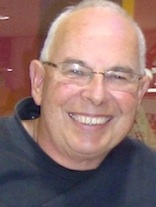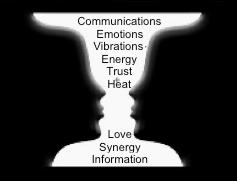
 |
| I write regular Strategic Snippets because I care about the success of your business. If you care about the success of someone else's business click "Send this page to a friend". Ask them to let me know that you were involved. |
Contact
Bruce Holland
| mob+6421 620 456 |
| Bruce.Holland@virtual.co.nz |
 |
Eight stories to change the world – or at least your organisation
One of the great lessons I’ve learned from working with Bill Veltrop and the Blue Star Future project has been the importance of stories in the change process. Bill says social systems are held in place by stories and structures. Most attempts at change have focused on changing constraining structures; things like the education system, the legal system, the political system, the news media, the commercial system and the measurement systems. Changing structures is difficult and usually leads to resistance. Changing stories, on the other hand, is totally painless and has no resistance; indeed when one has a new story in one’s head, it’s almost impossible to continue to do the things that seemed to make sense under the old story.
I’m sure this is a deeply important message when it comes to changing organisations as well. When we try to change the structures (restructuring, downsizing, reorganising) we nearly always run into resistance and destroy value. A far easier and more productive way to change an organisation is by changing its stories.
Here are some of the stories I think we need to change
1. From: “We are managing a machine” to “We are managing a living system”
Imagine if our managers believed they were custodians of a living system, rather than controllers of an economic machine.
Because of our machine story we put people into boxes (jobs), isolate them in silos (departments) and constrict them with policies and rules that sap humanity and creativity. We fail to realise that human beings require meaning in their lives as much as we require oxygen and nutrients in our bodies. Barry Oshry proved experimentally that the current ways of organising are bound to fail. They don’t work well even in the army or the church let alone business and society. We need to start thinking of work as a necessary part of a living system that helps provide our physical needs, our intellectual needs, our emotional needs and our spiritual needs.
If our story was about living systems we would stop restructuring every time a new CEO was appointed or a government changed. We would save ourselves from the endless cycle of centralising and decentralising; loosening and tightening structures; tinkering backwards and forwards like detailed mechanics. Rather we would start preparing the soil to plant and grow liberated people. We would allow the system to be more like beanbags and to move naturally towards its ‘sweet-spot’ that can only be interfered with by over-management. Instead of controls, regulation or manipulation, the way we control machines, we need to help people grow physically, mentally, emotionally and spiritually.
2. From: “We are all separate” to “We are all deeply connected”
Imagine if our managers knew the story that physicists have known for 50 years. Previously their story had been to see their science as the study of physical materials like solids, liquids and gases. Their new story is to see it as the study of how things are organised and relate to each other.


In business, we need to learn this story. Most managers spend most of their time focused on the individuals within their organisation (Peter, John and Mary). In the first chart they would be looking at separation and seeing the two faces (left-hand diagram).
If our story was about connectedness, as managers we would know that it is the space in between people that makes the most difference. Instead of seeing emptiness between people, we’d see the vase (right-hand diagram). We‘d see emotions, heat, vibrations, energy, trust, information, communication, synergy and love. Our job under this story is to fill the vase to the top with these things. In essence it is a move from product-centric to relationship-centric thinking. It’s from win-lose to win-win.
3. From” “Competition is the natural order” to “Collaboration is the natural order”
Imagine if our managers knew the story biologists know: human beings evolved as small weak animals. To overcome this weakness we had the choice of two evolutionary tracks: either to grow bigger, or to multiple our size by collaborating with others. We chose the second track. It’s no wonder we are born to collaborate, it’s built into our DNA!
At the organisational level, many large mature workplaces suffer from cutthroat competition from within their organisation; knives in the back; dogs eating dogs; but, new research is showing that stepping on people isn't the best way to get ahead.
Because of our competition story, today we seem to sublimate much of our human nature in the workplace. What I find is power, ego, separation and fear dominating over care, love and cooperation. We need to listen, love, care and support each other. Today’s problems both in organisations and in the world are seldom technical, they are nearly all based on poor human relationships. It’s caused because our story is of competition whereas it should be collaboration.
The best story for competition is told when you are trying to improve yourself, not beat others.
4. From: “We need to change the people” to “We need to draw out the greatness in everyone”
As managers, the story we tell ourselves is that our people are frail, weak and imperfect. It follows that our job is to change them and improve them. This is a total waste because it can’t be done. This story is only partly true; a more useful story is that we all have a bit of god in us and a bit of the devil. Managers with this story spend their time looking for the “god,” reminding people of the best of who they are, drawing out the greatness that already exists inside and putting this to work within the organisation. I wrote a book on this, it's called "Buddha Hunters."
5. From: “Economic growth must be maintained at all costs” to “Growth is the problem and cannot be sustained”
We have built nearly everything we believe in business on the story that growth can continue ad infinitum. Earth scientists and mathematicians know that this is nonsense.
I love the story told by Dr. Albert A. Bartlett in “The Most IMPORTANT Video You’ll Ever See.” He asks us to imagine bacteria growing steadily in a bottle. They double in number every minute. At 11.00 AM there is one bacterium in the bottle. At 12.00 noon the bottle is full. The question he asks is: “If you were an average bacterium in the bottle, at what time would you first realise that you were running out of space?” The answer is as follows:
- At 11:54 AM the bottle is 1.6% full and 98.4% empty (tons of room, no problem)
- At 11.55AM the bottle is 3.1% full and 96.9% empty (tons of room, no problem)
- At 11.56AM the bottle is 6.3% full and 93.7% empty (tons of room, no problem)
- At 11.57AM the bottle is 12.6% full and 87.4% empty (still tons of room, no problem)
- At 11.58AM the bottle is 25% full and 75% empty
- At 11.59AM the bottle is 50% full and 50% empty (a little more crowded than it used to be, but we still have half the bottle to go)
- At 12.00 noon the bottle is 100% full.
Now remember that the best research from Earth scientists shows, at the rate we are currently extracting resources we are already past 12.00 noon! They calculate we currently extract 1.4 planets to sustain our living standards. If the Earth was a company it would be bankrupt. Even if miraculously we found a whole new planet of resources it would be empty by 12.01 PM. See why the growth story is nonsense?
6. From: “We live in a world of scarcity” to “The most important things are plentiful”
From the previous paragraph I hope it is obvious that we need a new business model: one that does not depend on continuing economic growth. Fortunately this model already exists: it’s one that’s based on things that make us happy rather than things that make us miserable. I’m thinking of ideas, relationships, trust, and communication; all things that are plentiful and become even more valuable as they are used. I’m convinced we can future-proof our organisations for the next 50 years but only those who adopt this story.
7. From: “To become strong I need to improve my weaknesses” to “To become strong I need to grow my strengths”
Of all the business stories I’ve tried to change over the years this is the one that’s probably received the most “ahas.” It usually comes up when I’m introducing clients to Herrmann’s Brain Dominance Index. Our current story is really pervasive and quite stupid as I hoped the following story will show.
Steve Williams is talking to Tiger Woods: “Tiger I’m really pleased with the progress you’re making in your golf but your tennis is fairly weak. I want you to give up practicing golf for six months and concentrate on your tennis!”
8. From: “We are managing an organisational tree” to “We are managing a series of interconnected networks, both inside and outside the organisation”
When the story you tell is of managing an organisational tree, it makes sense to be on top, hierarchical and dominating. However when the story you tell is of networks you manage in a completely different way, based on network science and the laws of networks. You know your success will depend largely on how well you understand and manage networks and strategic partnerships both inside and outside the organisation.
Please let me know any other stories you think should be changed in business.
In the meantime, warmest wishes,
Bruce.
Bruce Holland
Virtual Group Business Consultants
Phone +6421620456 or Skype Bruce.Holland
www.virtual.co.nz
Go back to Index for Strategic Snippets
Key words: Leadership, leadership development, leadership management, leadership training, leadership program, leadership skills.


